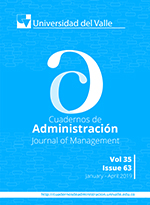Mud, value and welfare. An economic estimation of the impact in the Anchicayá river basin
Main Article Content
The implementation of modernizing projects in the midst of rural societies, in parallel with the great benefits in terms of regional and national growth, generates threats to local socio-ecological sustainability. Such is the case of the discharge of sludge generated by the Bajo Anchicayá dam in the Colombian Pacific in 2001. The economic assessment of the environmental impact is given to address the past, present and future impacts in cases such as the one described above where environmental goods and services as well as supervening exchange relationships are not guided by the logic of the market. However, this article attempts to account for the direction and scope of such effects, based on a pricing chrematistics and compensatory assessment claimed by court litigation by the affected communities under information restrictions and slightly commercialized economic dynamics. At the end, it was possible to establish the operability of the assessment methods, type of stated preferences, which simulate market conditions in favor of alternative strategies such as the transfer of benefits that while not infallible, with the lack of environmental accountancy, try to respect the spatial, time and socio-ecological complexity of territories such as the Pacific Coast.

